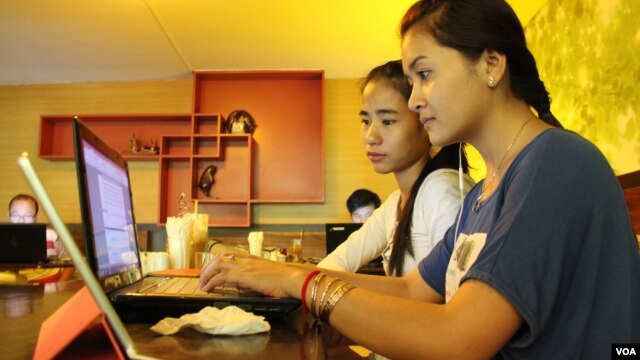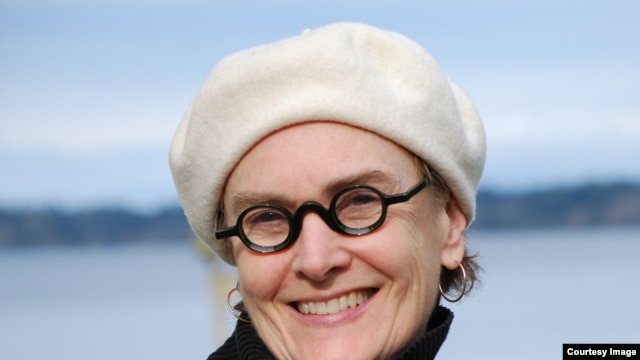Filmmaker Sees Online Censorship as Danger to Cambodian Democracy
Freedom of
expression online plays an important role in Cambodia’s developing
democracy says Ellen Grant, who recently produced a documentary called
"Cyber-Democracy: Cambodia, Kafka's Kingdom."
VOA | 3 November 2015
University
students from the Royal University of Phnom Penh browsing the Internet
at a coffee shop along Phnom Penh's Russian Federation Boulevard, June
13, 2014. (Photo: Suy Heimkhemra/VOA Khmer)
WASHINGTON DC— [Editor’s note:
Freedom of expression online plays an important role in Cambodia’s
developing democracy. Therefore, any form of censorship of online
communication among the Cambodian people represents a danger to
democracy in the country, says Ellen Grant, who recently produced a
documentary on cyberspace and its role in Cambodia. The film,
“Cyber-Democracy: Cambodia, Kafka’s Kingdom,” recently showed in Long
Beach, California, and in Los Angeles. Grant spoke with VOA Khmer about
the film and how it is being received.]
VOA Khmer: How did people react to the documentary?
I was very, very moved. Some people came up to me after the showing
in tears. They were so happy that someone had factually demonstrated
what’s going on in Cambodia. Also, I think they were very moved by
bravery of so many people who are standing up to authority so that their
voices can be heard.
What are their concerns over the current social and political developments in Cambodia?
For people I have spoken with, they are concerned that things are
coming to a head, and they are also concerned about the next election.
Hun Sen has seemed to dig in, and the opportunity for the opposition to
communicate with potential voters is being restricted by either
censoring the voices that are expressed and posted online and in public.
Ellen
Grant is an American filmmaker based in Washington State, who recently
produced a documentary about Cyber-democracy in Cambodia. (Courtesy
Image)
Cyber-democracy in Cambodia is a critical step toward making sure
that there is justice and an even application of the law. Without the
ability of Cambodians to communicate with each other and to demonstrate
to the world what’s going on inside Cambodia, I am fearful that
democracy will not succeed in that country.
With the leak of a drafted cyber-crime law, what do you think
would be the reaction to your documentary if it is shown in Cambodia?
I am not sure if this documentary will be screened publicly in
Cambodia. I’ve been cautioned that it would not be a good idea for me to
travel to Cambodia, nor would it be a good idea for the co-producer,
Dr. Gaffar [Peang-Meth] to travel to Cambodia at this time. I am hopeful
that people will hear about the documentary, which is currently online,
on YouTube, on video, and can be viewed without any kind of limitation.
So I hope that people take advantage of looking online to find the
documentary in Khmer.
How does your team feel about the achievement of the documentary?
I am very, very thankful for Dr. Gaffar’s organization, and also very
thankful for the folks who worked on the translation, on the narration
of it, and on the recording. It was a very, very important step to make
this documentary available to Khmer speaking people.
Do you and your team also plan to have the documentary screened somewhere else in the US?
For right now, I have just come back from Los Angeles and Long Beach.
But I think there is a possibility that it will be screened [further]. I
am certainly open to, either traveling with the film or allowing people
just to get people together to look at it. My suggestion to a number of
people I spoke to in Los Angeles was to show the video to a small group
of people, so there can be a discussion afterward, and some sort of
action plan to help promote positive change in Cambodia, which would be
the best way to go.




No comments:
Post a Comment